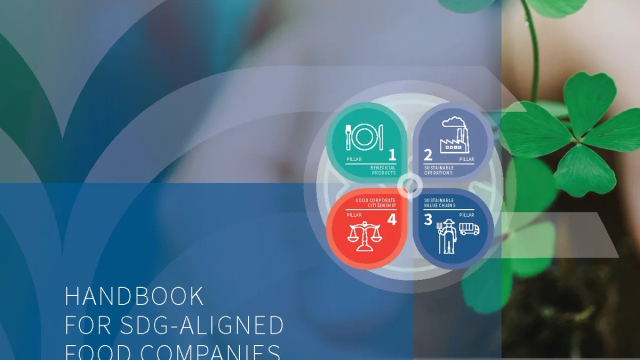Handbook for SDG-Aligned food companies
Four Pillar Framework Standards
December 2021
SDSN and the Columbia Center on Sustainable Investment (CCSI) launch the new Handbook for SDG-Aligned Food Companies: Four Pillar Framework Standards , a resource that sets out practical steps that food companies can take to align their strategies and practices with the UN Sustainable Development Goals (SDGs).
The handbook can furthermore be used as a pragmatic complement to our recently published International spillovers embodied in EU’s food supply chains study which describes the environmental impacts generated through the EU’s food supply chains.
Why is this handbook needed?
Companies and investors increasingly recognize that significant changes of direction are needed to align corporate activity with the SDGs.
However, many existing frameworks, practices, and reporting standards are not fit to purpose. For years, the lack of consensus on the key principles defining an “SDG-aligned” or “sustainable” business has created confusion and enabled greenwashing. Existing frameworks and ESG indexes have also generally overlooked or neglected certain aspects of business activities that are critical to understanding the overall impacts of companies on the SDGs. For instance, existing frameworks generally do not cover: (1) Impacts resulting from product use and marketing; (2) Impacts of companies’ tax practices and policy making influence activities, including lobbying; and (3) Impacts of litigation activities, including on human rights defenders and whistleblowers, among others.
We have developed the Four Pillar Framework and 21 standards to help food processing companies, investors, and other stakeholders understand how the food sector can and should align with the SDGs. While geared toward the food sector, many of the standards are relevant and adaptable to other sectors, as well.
Who is this handbook for?
- Food sector companies, in particular food processing companies, ready to make the necessary transformational changes to their businesses to align with the SDGs;
- Policymakers willing to drive the critical food system transformation needed to achieve the SDGs and to meet their own responsibility to achieve the SDGs;
- Investors seeking to address the ways in which their investment activities in the food sector impact people and planet; and
- Civil society organizations, academics, and affected and engaged members of the public who need to assess, monitor, and hold food processing companies accountable for meeting their sustainability expectations.
We intend to continue to deepen and expand our work on this Framework and welcome feedback and opportunities for exchanging viewpoints and information.
You can download an infographic summary of the Framework and visit the Food Sector and the SDGs webpage for more resources.
